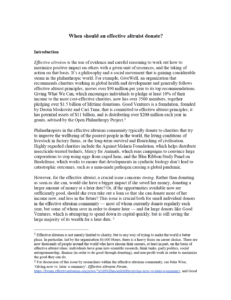When should an effective altruist donate?
William MacAskill (Global Priorities Institute, Oxford University)
GPI Working Paper No. 8-2019, published as a chapter in Giving in Time
Effective altruism is the use of evidence and careful reasoning to work out how to maximize positive impact on others with a given unit of resources, and the taking of action on that basis. It’s a philosophy and a social movement that is gaining considerable steam in the philanthropic world. For example, GiveWell, an organization that recommends charities working in global health and development and generally follows effective altruist principles, moves over $90 million per year to its top recommendations. Giving What We Can, which encourages individuals to pledge at least 10% of their income to the most cost-effective charities, now has over 3500 members, together pledging over $1.5 billion of lifetime donations. Good Ventures is a foundation, founded by Dustin Moskovitz and Cari Tuna, that is committed to effective altruist principles; it has potential assets of $11 billion, and is distributing over $200 million each year in grants, advised by the Open Philanthropy Project. [...]
Other working papers
Simulation expectation – Teruji Thomas (Global Priorities Institute, University of Oxford)
I present a new argument for the claim that I’m much more likely to be a person living in a computer simulation than a person living in the ground-level of reality. I consider whether this argument can be blocked by an externalist view of what my evidence supports, and I urge caution against the easy assumption that actually finding lots of simulations would increase the odds that I myself am in one.
On the desire to make a difference – Hilary Greaves, William MacAskill, Andreas Mogensen and Teruji Thomas (Global Priorities Institute, University of Oxford)
True benevolence is, most fundamentally, a desire that the world be better. It is natural and common, however, to frame thinking about benevolence indirectly, in terms of a desire to make a difference to how good the world is. This would be an innocuous shift if desires to make a difference were extensionally equivalent to desires that the world be better. This paper shows that at least on some common ways of making a “desire to make a difference” precise, this extensional equivalence fails.
Prediction: The long and the short of it – Antony Millner (University of California, Santa Barbara) and Daniel Heyen (ETH Zurich)
Commentators often lament forecasters’ inability to provide precise predictions of the long-run behaviour of complex economic and physical systems. Yet their concerns often conflate the presence of substantial long-run uncertainty with the need for long-run predictability; short-run predictions can partially substitute for long-run predictions if decision-makers can adjust their activities over time. …

